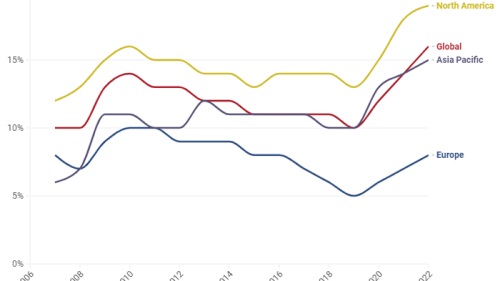Japan’s investment market is set fair for the future, with “the world’s most favorable borrowing environment” and increasing institutional demand for real estate.
A panel of international investors discussed the 20-year outlook at the ULI Japan Fall Conference, which took place in Tokyo in November.
Moderating a panel discussion, Daniel Klebes, partner at GreenOak Investment Management—one of the first foreign investors to make waves in Japan with Goldman Sachs in the 1990s—said that Japan’s market had developed from being a “high-risk, high-return” environment into a “low-risk, low-return” environment.
The panelists agreed that, with more investment capital targeting Japan and the low-interest-rate environment, returns would continue to be low, although remaining attractive due to the low cost and wide availability of debt.
A widespread complaint among foreign investors in Japan is a lack of deals, but Toru Bando, president and managing director at Morgan Stanley Capital, said: “It is hard to find deals anywhere. Japan is not a country where you can arrive yesterday, set up shop today, and buy tomorrow. Sometimes, you need to buy and sell just to stay in the market; we get deal flow in Tokyo because we are part of the market.”
Canadian real estate giant Brookfield is a relatively new player in Japan, but Patrick Boocock, managing partner and country head at Brookfield Asset Management, said the company sees more opportunities opening up in the future, especially in the form of long-term and complex situations.
“Every time we enter a new market, people say all the deals have gone! But we have managed to establish business in India and China. Patience is crucial; it took us five or six years to get embedded in India.
“In Japan, there is a momentum in corporate reform and succession issues with family-run companies which will offer opportunities for us,” he said. “Our strategy is to offer Japanese investors the chance to invest in our assets overseas.”
Eric Cheah, head of investment management, Asia Pacific, Investment Management Overseas, Union Investment Real Estate Asia Pacific, said the appeal of Japan would remain, despite the squeeze on returns, due to the market’s liquidity and stability. “If you ask any investor whether they would rather have lower returns and the same level of risk or higher returns and higher risk, they will always accept the lower return.”
Bando said the market was set fair for the medium term. “Compared with 2007, prices feel lower. And you would bet that the Bank of Japan will keep interest rates lower for longer, giving the best borrowing environment in the world. We have seen zero pushback in terms of funding, unlike in Australia and South Korea, for example. In Japan, you can borrow up to 75 percent of value for 1 percent and cruise. I think it will be more of the same going forward.”
He added that a further mitigating factor was the homogenization of global gateway cities. “In previous cycles, Tokyo has been expensive; but today, apart from Hong Kong, global cities have similar pricing. Tokyo is not out of line with London or New York.”
Bando also argued that the quality of life in Japan would continue to attract visitors and capital. “More Japanese ought to travel overseas, then they would realize how good we have it here!”
The panel also touched briefly on two sectors that have attracted much recent interest and which also seem to lock in with long-term trends. Japan’s aging population means that senior housing ought to be an important part of the market, but Klebes said: “I’ve been looking at it for 20 years and still haven’t found the right model for investing.”
Rising visitor numbers—they have more than doubled in five years—have increased demand for hotels, and many cities have seen office-to-hotel conversions. However, Bando said: “There has been a lot of blind buying in the hotels sector, and I expect to see distressed opportunities either before or after the Olympics.”
Matthew Zann, managing director at logistics developer ESR, bit the bullet and made a long-term prediction. He expects the market to be set fair through to the Tokyo Olympics in 2020, to be boosted by further stimulus from 2020 to 2025, and then see rising interest rates through to 2030, by which time he expects something unforeseen to upset the market, possibly a natural disaster.
There was some disagreement on the panel over the role that millennials would play in shaping Japan’s real estate market over the next 20 years. Boocock said he expected their demands to change the way real estate developers built and managed their assets. “In New York, there is a lot of development and redevelopment to accommodate their desires,” he said.
Cheah said: “I don’t think millennials know what they want! When they get older, they will change and want to buy houses or cars in the same way that older people do. A good location will still be a good location.”
Bando added that he felt “some megatrends will be fads.” In the long term, the demand of institutional capital for real estate would support the market, he said.




